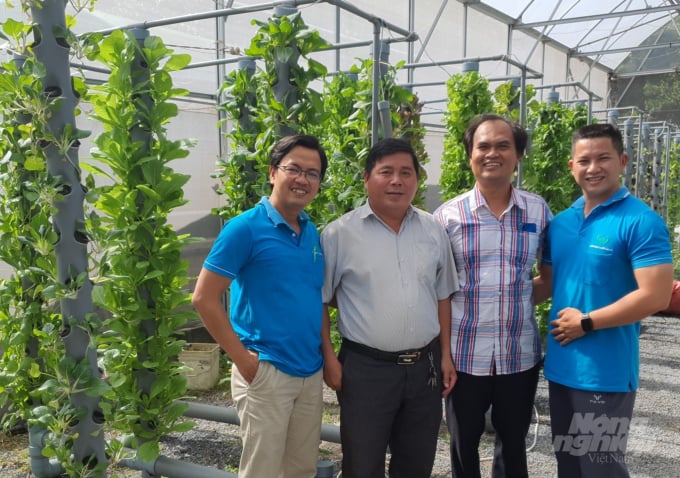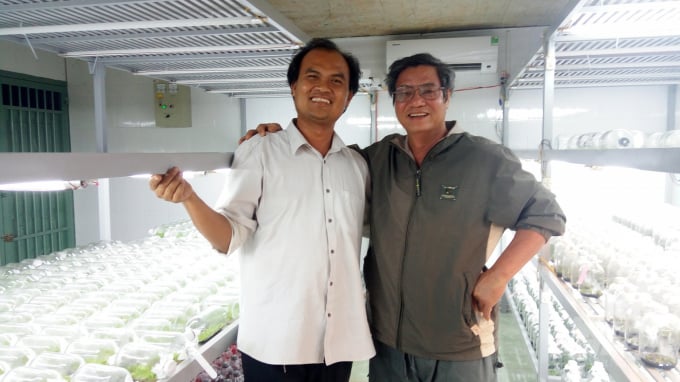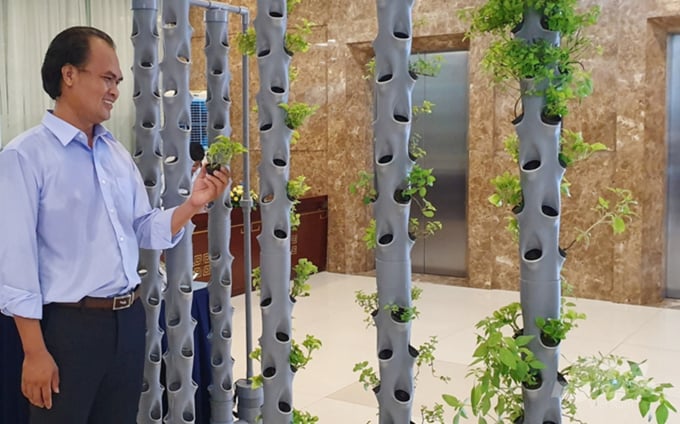October 31, 2025 | 01:24 GMT +7
October 31, 2025 | 01:24 GMT +7
Hotline: 0913.378.918
October 31, 2025 | 01:24 GMT +7
Hotline: 0913.378.918

Mr. Pham Thanh Loc (Cu Chi)'s Ero-farm vertical aeroponic growing system has been visited by many farmers and cooperatives in Ho Chi Minh City and other provinces to exchange experiences.
We met Mr. Pham Thanh Loc, Director of Thanh Binh High-tech Agriculture JSC, in Cu Chi shortly after he was awarded the Certificate of Merit by the HCM City Farmers Association for the period 2017-2022. He was one of seven prominent farmers from HCMC who received the Certificate of Merit from the Prime Minister.
Through his stories, we got a deeper understanding of this unique farmer, who possesses a strong passion for technology research, as well as market acumen and the spirit of an agriculturist desiring to bring the greatest products for human health.
He was born into an agricultural family in Cu Chi, the land of steel. In 1999, he passed four universities but opted to study at the Chemistry Faculty of Ho Chi Minh City's University of Science. Loc pursued a master's degree in "Chemistry of natural compounds" with the goal of gaining further knowledge to assist and support farmers in being more productive and producing higher-quality products.
In 2003, he began conducting research on his own, spending long days in the laboratory. "Because I lacked both facility and funding for research, my team and I had to construct a laboratory out of a pig barn and operate using handmade equipment," Loc said.
The bioreactor tissue culture technique was relatively new in Vietnam at the time. While the Taiwanese-Japanese tissue culture technology Bioreactor costs around VND 200-300 million per set and has a rather low yield. These limitations, along with their determination, have prompted Loc and his colleagues to tinker with research and use advancements in the fields of biotechnology in tissue culture in order to create new plant varieties with increased economic efficiency.

Mr. Pham Thanh Loc (white shirt) in the tissue culture room.
That day, the first-hand innovation was introduced - the bioreactor system was utilized in the field of in vitro culture to grow orchids, ornamental plants, and medicinal plants. "The Bioreactor system is the first temporary submerged tissue culture vessel in Vietnam," Loc explained.
The concept was effective, generating around VND 120 million in revenue and VND 40 million in profit every month. The initial product provided the impetus for Loc to pursue his passion for invention and laid the foundation for the guy to enter the area of invention.
Loc was the youngest member of the Vietnam Invention Association when it was founded in 2015. When tissue culture techniques achieved some success, Loc began offering free workshops, guiding, and disseminating information and techniques to young people and farmers seeking vocational training. Additionally, Loc studied and produced other formulations of Odora mosquito repellent essential oil and Ylang high-quality mosquito repellent essential oil, which was recognized as a "2015 quality product voted by customers" by the Vietnam Quality Institute. In 2014, revenue from essential oil production reached VND 100 million, while in 2015, it reached VND 350 million.
Loc was acknowledged as one of 85 teenagers with highly qualified in production, business, research, and technology transfer, engineering, technology, industrial development, environmental protection, and new rural building... in November 2016. He received the Central Youth Union's 11th Luong Dinh Cua Award in 2016. More notably, Loc received one of four Prime Minister's Certificates of Merit.

Mr. Pham Thanh Loc with the Ero-farm vertical aeroponic growing system was introduced at a Fair.
Ero-farm is constructed with a vertical tower to maximize space efficiency and four machine lines to accommodate a variety of needs, including square, rectangular (from four to eight pillars); U, I, and L shapes, and the ability to move conveniently.
Each machine costs between VND 3 and 5 million in total, including all equipment and components for cylinders, pipelines, pumps, and installation credit; moreover, the amount of manure and seeds is sufficient for seven weeks. The machine is capable of planting 243 trees (on an area more than 1m2) or larger. It yields between 15 and 30 kg of vegetables after harvesting, depending on the kind.
Mr. Pham Thanh Loc and his colleagues have pioneered the application of scientific and technological advancements to manufacturing. Using hydroponic technology, Loc and his colleagues studied and invented the Unique Ero-farm vegetable aeroponic farming system
"The first aim was to sell clean veggies grown on a 1,200-square-meter farm to urban residents. However, we opted to make it smaller and more compact so that people may utilize it without having to worry about other factors such as climate, irrigation, or remediation work," Loc said.
Over time, he saw that the vertical pillar method for big farms is too expensive in comparison to the high cost of land rental in Ho Chi Minh City, and therefore invented the cable vertical aeroponic farming system. "It is flexible and runs to sub-sections of seedlings, huge trees, and picking regions, allowing us to optimize the space. The system is now complete, and we have mastered vertical aeroponics technology ", Loc said.
At the start of 2019, the Ero-farm vegetable vertical aeroponic farming system was transferred to various farmers and customers, as well as recognized for patent rights by Vietnam's National Office of Intellectual Property.
The Ero-farming technique is simple; there is no need to plow, fertilize, or combine nutrients; everything is automated. Soak the substrate in water first, then incubate the seeds in the medium. After incubation, seedlings are inserted into each planting location on the pillar. Each planting system is equipped with a drip watering system, rotates on a regular basis, and is powered by an automated pump that operates on a 15-minute cycle/time to conserve energy, cut expenses, and provide enormous economic advantages.
One of the system's highlights is the inclusion of a nutrient bag or fertilizer. "I aim to develop a fertilizer that saves users time. Typically, technical vegetable cultivation requires frequent fertilizer mixing. In response to farmer's needs for natural and organic products, we manufacture organic fertilizer with additional minerals such as iron, zinc, and calcium, and use natural components such as essential oils, vitamins, and so on. It takes less than 30 seconds each week to make fertilizer, similar to a tea bag; simply open and install the old one, remove it, and replace it with the new one ", Mr. Loc eagerly stated.
According to Mr. Pham Phu Cuong, Vice Chairman of the Cu Chi District Farmers' Association, with the advancement of science and technology, particularly during the current 4.0 technology period, all levels of associations in Cu Chi district have collaborated with the government to provide information and communicate the promotion of mechanization and the application of science and technology in agricultural production, thereby reducing labor costs, increasing product yields, and reducing product costs.
According to Mr. Cuong, the present barrier for farmers engaging in the application of science and technology to agricultural production is the capital, and as a result, they remain "hesitant and contemplative" regarding economic efficiency prior to investing in agricultural production. Young individuals like Mr. Pham Thanh Loc, who are passionate about agriculture and are confident in their ability to learn and share experiences, will invest aggressively in greenhouses, net houses, and equipment... Capital will be reimbursed after 3-5 years of successful operation.
Translated by Linh Linh

(VAN) The collaboration between local agricultural extension forces and businesses is the foundation for effectively implementing the one-million-hectare high-quality, low-emission rice project.

(VAN) Minister Tran Duc Thang affirmed that the Ministry of Agriculture and Environment remains steadfast in its goal of green and sustainable development, laying the foundation for double-digit growth in the 2026-2030 period.

(VAN) Sustainable rice production requires a comprehensive soil management strategy, the application of technology, value chain linkages, and integrated economic, social, and environmental solutions.

(VAN) Kim Anh commune (Hanoi) is shifting to biosecure livestock farming to improve product quality and increase sustainable economic value.

(VAN) Early on October 30, all relief supplies from the Russian Federation arrived at Noi Bai Airport and immediately transported to Hue City during its peak of the flooding.

(VAN) According to Deputy Minister Nguyen Hoang Hiep, just 20 days after the appeal was launched, Viet Nam received assistance from 30 countries and international organizations, with a total value of USD 9.7 million.

(VAN) SEAMAP and ROMONA sign a 2025 - 2028 Memorandum of Understanding, marking a new chapter in Viet Nam’s marine geodesy and positioning technology development.